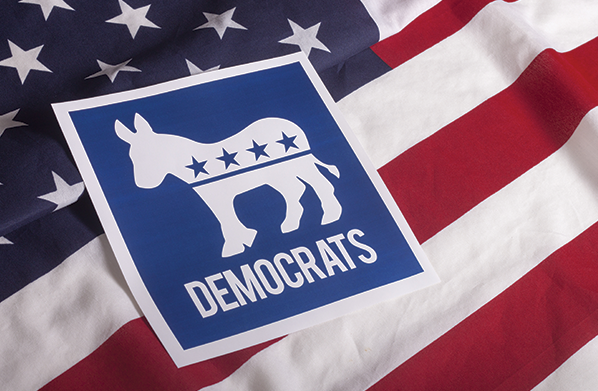One of the things that impresses me about today's too-close-call special congressional election in Georgia's Sixth District is how powerful sisterhood is.
America has never had a woman president in all 200-plus years of its existence, but we came that close in the equally hotly contested 2016 presidential election. And turns out that the Sixth District, which comprises Atlanta's northern suburbs has never had a woman representative, either, since it was set up during the 1840s. So, naturally, the women of the Sixth District have banded together, crossing party lines to present a united front for female GOP candidate Karen Handel. Now, Handel, a veteran businesswoman, isn't the world's most exciting candidate–but then again, neither was Hillary Clinton. And Handel has something else in common with Clinton: She's a former secretary of state, except that the "state" in question was Georgia, not the U.S. So Handel's fans have temporarily retired their political difference for a hoped-for resounding defeat of that white cis-het male Democrat andidate on the other side and head up to Washington to say, "Take that, patriarchy!" Because wasn't it Madeleine Albright (yet another former secretary of state) who said, during Clinton's campaign that there's "a special place in hell for women who don't help each other"?
Except, um, not. Or maybe that special place in hell froze over.
In fact, the Sixth District race to fill the congressional seat of Republican Tom Price, now President Trump's health and human services secretary, seems to be a textbook example of the proposition that there may in fact be no such thing as "sisterhood" between women at all. An article about the Georgia race in New York magazine, titled "Can the New Activist Passon of Suburban White Women Change American Politics" and written by the reliably ideological Rebecca Traister, mentions Handel exactly three times: once to tell you that she's the GOP candidate, once to inform you that the polls show her neck-and-neck with her Democratic opponent, Jon Ossoff, and once to dismiss her as "one of the most virulent opponents in the country of reproductive rights" (translation: Handel opposes abortion). That's it.
Traister's article, centered around her attendance at a pizza party in affluent Sandy Springs, Georgia attended by about 30-pro-Ossoff women, is full of quotes like these:
Ann White, 63, is a former speech pathologist, the mother of teenagers, and a Democrat married to a Republican; she’s never been active in electoral politics before. “I just assumed that Hillary would win,” she said of the 2016 election. As the realization that Clinton had not won began to sink in, she felt herself changing. “The profanity filter on my mouth totally went away,” White said, describing a phone call days after the election with a like-minded friend from California. “I lost it, and my kids turned around and went ‘Whoa!’ Because they’ve never heard me say the F-word before.”…
White discovered and became involved in Liberal Moms of Roswell and Cobb Counties, or LMRC, and then Pave It Blue, a liberal women’s group that maintains a closed Facebook page to communicate and plan their activism. “My favorite slogan,” she said, trying to keep from crying as she spoke, “is ‘You are not alone.’ I found my people.”….
“Every time I see an Ossoff sign I feel like I have an ally,” said Tamara Brooking, a 50-year-old research assistant to a novelist….
Many women have put LMRC magnets on their cars; if they spot a magnet on the parked car, they turn it 180 degrees as a kind of greeting. “It’s to let each other know, ‘my sisters are here,’” said Jennifer Mosbacher, 42….
[S]everal describe how they’re not sleeping, instead staying up all night scrolling through Facebook and message boards, reading political posts and messaging each other. The sheer amount of time they are devoting to political organizing is staggering, especially given that most of them work full time and have children.[Mosbacher, who has a 9-year-old daughter and runs her own business said, “My business [and] my family have suffered from the work we’re doing. Our fridge is barren; my daughter is like ‘Are we going out again?’”….
“I tell people that I am fresh out of f—s,” says Tamara Brooking. “Seriously. I’m done. I’m done pretending that your hateful rhetoric is okay. I’m done pretending that people like us must be quiet to make you feel comfortable.”
Traister paints this gaggle of Facebook-binging, F-bomb-dropping moms as typical white-glove-wearing suburban Southern ladies who somehow got "woke" after Clinton lost the election sort of in the way Betty Friedan got woke from housewifery during the 1960s–although in actuality Traister's subjects are to a woman lifelong Democrats. The "novelist" Tamara Brooking seems to be researching for is actually her mother, the prolific, super-successful romance author Iris Johansen (it's nice to be on your mom's payroll at age 50). Ossoff's campaign has outspent Handel's by nearly a five-to-one margin: $23 million to her $4.5 million, with most of the Ossoff money coming from outside Georgia in the liberal-elite enclaves of the Northeast and California.
So I can't tell from Traister's article whether suburban white women really are changing American politics. But can tell one thing: "Sisterhood" is not what comes to mind when Democratic women talk about Republican women.


